#peter stahl
Explore tagged Tumblr posts
Text
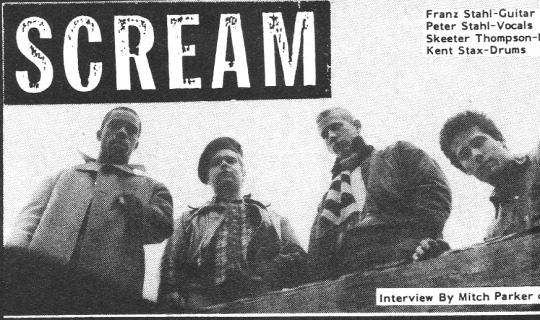
#scream#franz stahl#peter stahl#hardcore punk#post-hardcore#skeeter thompson#kent stax#80s hardcore#DC hardcore#punk
2 notes
·
View notes
Text
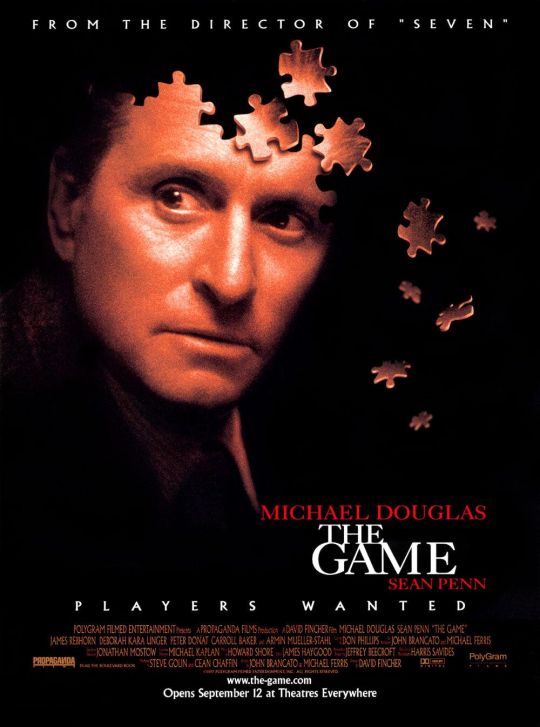
#The Game#Michael Douglas#Sean Penn#Deborah Kara Unger#James Rebhorn#Peter Donat#Carroll Baker#Armin Mueller-Stahl#David Fincher#1997
14 notes
·
View notes
Text
June Stahl leave the room challenge
#nina rewatches sons of anarchy#why is she LURKING in every police station scene???#go home june#i know that when she dies ill miss her#but for now go AWAY june!!!!#june stahl hank schrader and peter strahm would all hate each other but theyre the same character
2 notes
·
View notes
Text
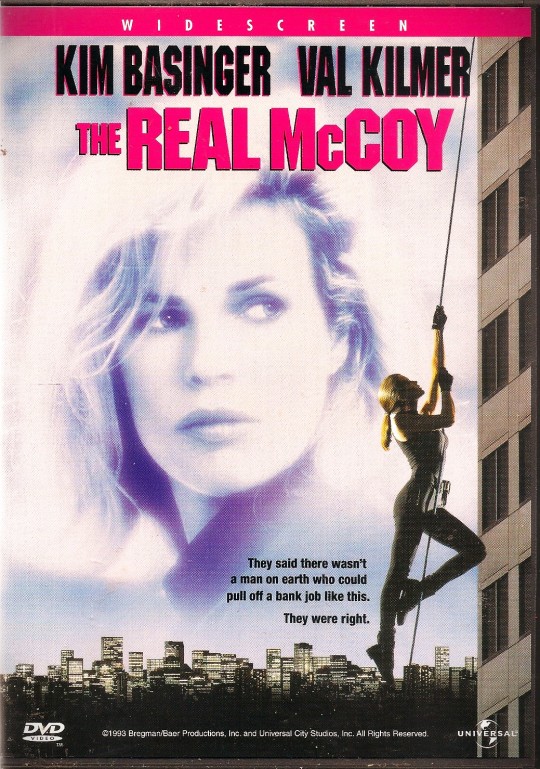
Bad movie I have The Real McCoy 1993
#The Real McCoy#Kim Basinger#Val Kilmer#Terence Stamp#Gailard Sartain#Zach English#Raynor Scheine#Deborah Hobart#Pamela Stubbart#Andy Stahl#Dean Rader-Duval#Norman Max Maxwell#Marc Macaulay#Peter Turner#David Dwyer#Frank Roberts#Robert Glover#Claude File#David Hart#Henry Stram#Larry Black#Rebecca Wackler#Saundra Dunson-Franks#Rebecca Koon#Stephanie Astalos-Jones#Jack Wilkes#Tom Even#Jill Jane Clements#Al Hamacher#Edith Ivey
4 notes
·
View notes
Text
youtube
#der joker#peter patzak#1987#peter maffay#tahnee welch#elliott gould#armin-müller stahl#wahnfried#der eisbär#tilt
2 notes
·
View notes
Text
Rookie-Critic's Top 25 Films of 2022: #4: Marcel the Shell with Shoes On (dir. Dean Fleischer-Camp)

Our next entry was nominated in the Animated Feature Film category at the Oscars, although I'm not sure if I would consider this truly an animated film. Regardless, this one's possibly the sweetest film from last year.
What a charmer, Marcel is. This little shell with shoes on gets the award for the most adorable character of 2022, and it helps that the whole film is one gigantic uplift of a movie. The creativity in the set pieces, in the way Marcel and his fellow shells maneuver the big world around them, and the heart the little guy puts into every action he takes is just so wonderful. Not to mention how hilarious it all is. The jokes in the film never miss, and, like all the best family entertainment, there are jokes in there aimed at the adults in the room that are innocent enough to go right over the heads of the younger ones in the audience. Jenny Slate delivers a career-best performance as the titular Marcel, bringing all of the child-like wonder and hope to the role that all of us could use more of. However, as amazing as Slate is, the real show-stopper performance in this one goes to Isabella Rossellini as Marcel's grandmother, Nana Connie, who acts as Marcel's sole companion for most of the film. There is a scene involving Nana Connie and a ladybug in this movie that could easily take the top spot for "Most Moving Film Moment of 2022." It's a unbelievably beautiful moment that moved me to tears in a film that had, up until that point, been mostly just good, wholesome, sweet fun, and it has forever cemented a place in my heart because of it. The film is done in a mockumentary style, with director Dean Fleischer-Camp inserting himself into the film, like the Rob Reiner to Marcel's Spinal Tap, and it makes everything feel very intimate. Marcel isn't just a little claymation figure, he is a fully realized personality. We see Marcel candidly, like we'd see anybody else, and it makes his tiny world feel very real, and very big. We see the world the way Marcel does: vast, wonderful, and full of the possibility that something so seemingly endless brings. A film so good-natured, with characters so lovable, that daring to dislike anything about it feels tantamount to turning away the love of a puppy. Please watch Marcel the Shell with Shoes On. Allow this little shell boy to sweep you away on an adventure that will make you laugh, make you cry, and make you fall in love with all the tiny, wonderful things the world has to offer (Marcel included).
Currently streaming on Showtime.
You can read my original review of Marcel the Shell with Shoes On here.
#The Top 25 Films of 2022#Marcel the Shell with Shoes On#Marcel the Shell#Dean Fleischer-Camp#Jenny Slate#Isabella Rossellini#Rosa Salazar#Thomas Mann#Lesley Stahl#Nathan Fielder#Andy Richter#Jessi Klein#Peter Bonerz#film review#movie review#2022 films
5 notes
·
View notes
Text
Blackbeard's Ghost (1968)


Blackbeard's Ghost by Ben Stahl (1965)
0 notes
Text
Magische Postmoderne. Bei Faustkultur wieder online: Ute Stefanie Strasser über ANHs "Aeolia.Gesang".
→ D o r t : Siehe auch → Ralf Schnell, “Existentielle Existenz – Poesie der Existenz”, Anmerkungen zum langen Gedicht: Kurt Drawert und Alban Nikolai Herbst
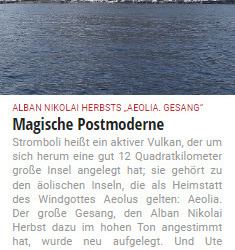
View On WordPress
#Aeolia.Gesang Arco#Alban Herbst Faust Kultur#Alban Nikolai Herbst Aeolia.Gesang#Angelika Schmitt Henrieke Stahl Poesie Existenz Gegenwart#Herbst Aeolia.Gesang Ralf Schnell#Kurt Drawert#Peter Lang Poesie Existenz Gegenwart#Ralf Schnell Kurt Drawert#Ute Stefanie Strasser Aeolia.Gesang
0 notes
Text
Peter Skubic - Schmuck - eine Hommage
Peter Skubic, 1935 in Gornji Milanovac geboren war einer der bedeutendsten und einflussreichsten Künstler des Zeitgenössischen Autorenschmucks, einer Disziplin, die sich ab den 60er Jahren der Öffnung des Schmucks hin zur autonomen künstlerischen Ausdrucksform widmete. Diesen Ansatz formulierte Skubic lapidar in seinem künstlerischen Credo: „Schmuck ist eine geistige Disziplin“. Seit den 60er…

View On WordPress
#Aufbautechnik#Autorenschmuck#Doctor Honoris Causa#Edelstahl#Ehrenring der Gesellschaft für Goldschmiedekunst#Hommage#Künstler#Kulturpreis der Stadt Wien#Peter Skubic#Petra Zimmermann#Pionier#Postmoderne#Provokateur#Schmuck#Schmuck aus Stahl#Schmuckgestalter#Schmuckkunst#Spiegel#Spiegel-Objekte
0 notes
Text








#M (1931)#FRITZ LANG#PETER LORRE#Otto Wernicke#Gustaf Gründgens#Ellen Widmann#Inge Landgut#Theodor Loos#Friedrich Gnaß#Fritz Odemar#Paul Kemp#Theo Lingen#Ernst Stahl-Nachbaur#WATCHING#mystery#murder
1 note
·
View note
Text
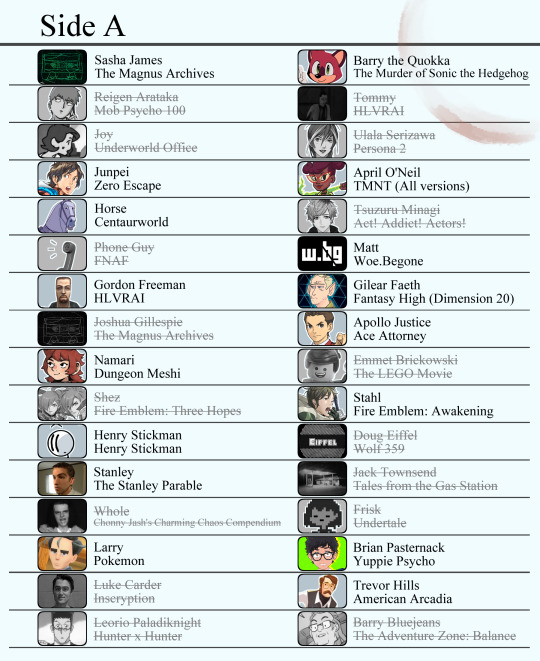
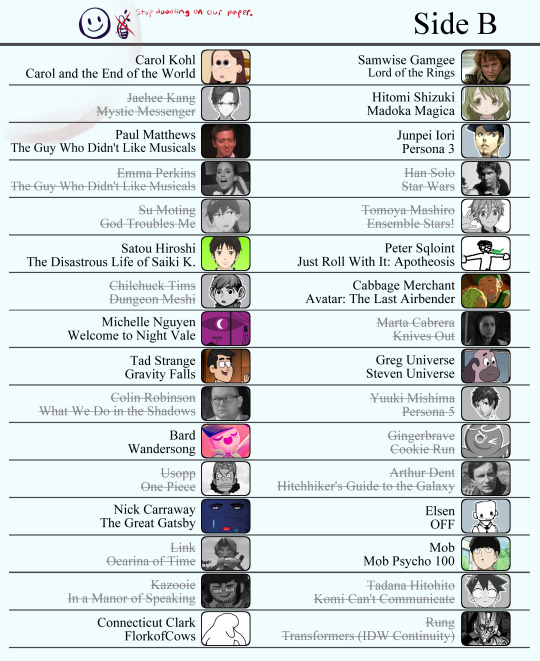
Just Some Guy Joust - Contestants List
Note: This is NOT the order of the brackets. Like with the last tournament, the order of the brackets will be a surprise. This list was randomized from the brackets I set up and does not represent who each character will be up against. The only thing you know for sure which side of the bracket they're on. When the polls go up, they'll be posted in order based on the list here, NOT based on where their brackets actually are!
Round 1 of Side A is over! Round 1 of Side B is CURRENTLY UP!
(Full list of characters in text format is under the cut)
Side A
Sasha James (The Magnus Archives)
Reigen Arataka (Mob Psycho 100) - died round 1
Joy (Underworld Office/Charlie in Underworld) - died round 1
Junpei (Zero Escape)
Horse (Centaurworld)
Phone Guy (FNAF) - died round 1
Gordon Freeman (HLVRAI)
Joshua Gillespie (The Magnus Archives) - died round 1
Namari (Dungeon Meshi)
Shez (Fire Emblem: Three Hopes) - died round 1
Henry Stickmin (Henry Stickmin)
Stanley (The Stanley Parable)
Whole (Chonny Jash's Charming Chaos Compendium) - died round 1
Larry (Pokemon)
Luke Carder (Inscryption) - died round 1
Leorio Paladiknight (Hunter x Hunter) - died round 1
Barry the Quokka (The Murder of Sonic the Hedgehog)
Tommy (HLVRAI) - died round 1
Ulala Serizawa (Persona 2: Eternal Punishment) - died round 1
April O'Neil (TMNT - All versions)
Tsuzuru Minagi (Act! Addict! Actors!) - died round 1
Matt (Woe.Begone)
Gilear Faeth (Fantasy High - Dimension 20)
Apollo Justice (Ace Attorney)
Emmet Brickowski (The LEGO Movie) - died round 1
Stahl (Fire Emblem: Awakening)
Doug Eiffel (Wolf 359) - died round 1
Jack Townsend (Tales from the Gas Station) - died round 1
Frisk (Undertale) - died round 1
Brian Pasternack (Yuppie Psycho)
Trevor Hills (American Arcadia)
Barry Bluejeans (The Adventure Zone: Balance) - died round 1
Side B
Carol Kohl (Carol and The End of The World)
Jaehee Kang (Mystic Messenger) - died round 1
Paul Matthews (The Guy Who Didn't Like Musicals)
Emma Perkins (The Guy Who Didn't Like Musicals) - died round 1
Su Moting (God Troubles Me) - died round 1
Satou Hiroshi (Disastrous Life of Saiki K.)
Chilchuck Tims (Dungeon Meshi) - died round 1
Michelle Nguyen (Welcome to Night Vale)
Tad Strange (Gravity Falls)
Colin Robinson (What We Do in the Shadows) - died round 1
The Bard (Wandersong)
Usopp (One Piece) - died round 1
Nick Carraway (The Great Gatsby)
Link (Ocarina of Time) - died round 1
Kazooie (In a Manor of Speaking) - died round 1
Connecticut Clark (FlorkofCows)
Samwise Gamgee (Lord of the Rings)
Hitomi Shizuki (Madoka Magica)
Junpei Iori (Persona 3)
Han Solo (Star Wars) - died round 1
Tomoya Mashiro (Ensemble Stars!) - died round 1
Peter Sqloint (Just Roll With It: Apotheosis)
Cabbage Merchant (Avatar: The Last Airbender)
Marta Cabrera (Knives Out) - died round 1
Greg Universe (Steven Universe)
Yuuki Mishima (Persona 5) - died round 1
Gingerbrave (Cookie Run) - died round 1
Arthur Dent (Hitchhikers Guide to The Galaxy) - died round 1
Elsen (OFF)
Mob (Mob Psycho 100)
Tadano Hitohito (Komi Can't Communicate) - died round 1
Rung (Transformers - IDW Continuity) - died round 1
#tumblr showdown#tumblr tournament#brackets#just some guy#some guy joust#when polls post you'll be able to find them easily using the next tag ->#tournament poll
197 notes
·
View notes
Photo

Eyewitness Accounts of the London Blitz
The London Blitz (September 1940 to May 1941) was a sustained bombing campaign by the German Air Force during the Second World War (1939-45). Londoners were subjected to nightly bombings that killed thousands, destroyed homes, and necessitated long and uncomfortable nights spent in air raid shelters. This article tells the story of the Blitz through the eyes of those who experienced it firsthand.
After the fall of France in the early summer of 1940, the German Air Force (Luftwaffe) set itself the task of destroying the British Royal Air Force (RAF) both in the air and on the ground, a necessary prelude to an invasion. However, as the RAF began to win the Battle of Britain and so maintain air superiority, the Luftwaffe switched objectives to the bombing of cities, particularly London, in the hope of destroying civilian morale. Colonel Adolf Galand of Luftwaffe Jagdgruppe 26 explains this switch:
We didn't know at the time why he changed to London: we had only to obey orders. I believe today that Hitler and Göring wanted to make use of their advantage of having the capital of the enemy in the range of their fighters which could therefore escort the bombers. On the other side Berlin was far out of the effective range of the RAF at this time...Nobody knew at the time how much was needed to destroy a great part of the town. Perhaps Hitler and Göring hoped that they would force England to negotiate after these attacks.
(Holmes, 138)
Peter Stahl, a crew member of a Junkers Ju 88, noted in his diary his experience of bombing London in one of the first raids in early September 1940:
It must be terrible down there. We can see many conflagrations caused by previous bombing raids. The effect of our own attack is an enormous cloud of smoke and dust that shoots up into the sky like a broad moving strip.
(Holland, 731)
On the ground, F. W. Hurd, a member of the Auxiliary Fire Service (AFS), describes the sound of a bomb dropping close to him when fighting a fire in a London gasworks:
Guns started firing, and then I had my first experience of a bomb explosion. A weird whistling sound and I ducked behind the pump with the other two members of the crew. The others, scattered as we were, had thrown themselves down wherever they happened to be. Then a vivid flash of flame, a column of earth and debris flying into the air and the ground heaved. I was thrown violently against the side of the appliance…what a sight. About a mile to our right was the river front. The whole horizon on that side was a sheet of flame. The entire docks were on fire! On all other sides it was much the same. Fire everywhere. The sky was a vivid orange glow…And all the time the whole area was being mercilessly bombed. The road shuddered with explosions. AA shells were bursting overhead…The shrapnel literally rained down. It was now about midnight and still the racket kept on. It surprised me how quickly one got used to sensing whether a bomb was coming our way or not.
(Gardiner, 15-16)
Bombs landed on all sorts of places, but it was local landmarks being destroyed that often shocked the most, as explained by Anthony Heap, a local government official:
I heard that Tussaud's cinema caught a packet last night. So as soon as the All Clear went at 6.25 I dashed along to see. And by gosh it had too. Only the front of it in Marylebone Road and the proscenium was left standing. The rest was completely demolished as were some buildings behind it as well…not a single window in any building in the vicinity remained intact. Huge crowds thronged along the Marylebone Road to see the ruins. It was one of the sights of London today.
(Gardiner, 44)
Londoners went on with their daily lives as best they could, as explained here by Phyllis Warner:
One of the oddest things about our everyday life is its a mixture of ruthless horror and every-day routine. I pick my way to work past the bomb craters and the shattered glass, and sit at my desk in a room with a large hole in the roof (a block of paving stone came through). Next to a house reduced to matchwood, housewives are giving prosaic orders to the baker and the milkman. Of course, ordinary life must go on, but the effect is fantastic. Nobody seems to mind the day raids. It is the nights which are like a continuous nightmare, from which there is no merciful awakening. Yet people won't move away. I know that I'm a fool to go on sleeping in Central London which gets plastered every night, but I feel that if others can stand it, so can I.
(Gardiner, 48)
Sometimes people had no time to seek shelter, as told here by an anonymous East Ender:
The day I was hit was October 13th, 1940. About ten to eight I said to my wife and my in-laws, 'Well, I'll be off now,' and I just walked out the door. Lovely, big three-floor houses they were and I just walked up the approach road about twenty yards from the church which was our air-raid post and suddenly there was – shh – nothing. I heard nothing and I fell flat on my face. I picked myself up, I turned around and all I could see was just a grey curtain hanging down the middle of the road, about twice as wide as this pub. It was just a brownish-grey curtain hanging there and I thought, My God, something's happened. So I staggered down to the post and I said to the post warden, 'Jim, I think something's happened up at the Prince of Wales.' When we went up there and when I saw it I said, 'Christ almighty, the family's down there!' And there it was – we were there, about fourteen of us all on this big row of houses, and it was just one bloody great hole.
(Holmes, 140-1)
The authorities took some months to build communal shelters and then make sure they were not themselves unhealthy death traps. Barbara Nixon, an Air Raid Precaution (ARP) volunteer, describes the poor state of shelters in her district in Finsbury:
They were poorly ventilated, and only two out of nine that came in my province could pretend to be dry. Some leaked through the roof and umbrellas had to be used; in others the mouth of the sump-hole near the door had been made higher than the floor, and on a rainy night it invariably overflowed to a depth of two inches at one end decreasing to a quarter of an inch at the other, and rheumaticky old ladies had to sit upright on their benches for six to twelve hours on end, with their feet propped up on a couple of bricks. four or five times during the night we used to go round with a saucepan and bucket baling out the stinking water…There were chemical closets usually partially screened off by a canvas curtain. But even so, the supervision of the cleaning of these was not adequate. Sometimes they would be left untended for days on end and would overflow on to the floor…Then there was the question of lights…We had one hurricane lamp for about fifty people…The one paraffin light was the only heating that there was in those days. It was bitterly cold that winter.
(Gardiner, 62)
A shelter was not a guarantee of safety. Margaret Turpin recalls the night her shelter was hit by a bomb when she and her family found themselves buried in rubble:
I must have had lots of periods of unconsciousness…I remember seeing an ARP helmet, and it was way, way up, a long way away. And then suddenly it was quite near. I do remember the man saying to me, 'We'll soon have you out.' He said, 'All we've got to do is get your arm out.' And I looked at this arm that was sticking out of the debris, and I said, 'That's not my arm,' and he said, 'Yes it is love, it's got the same coat'…and I don't remember coming out of the shelter. I do remember being in the ambulance, and I think for me that was probably the worst part…I felt somebody's blood was dripping on me from above, and I found that awful - mainly I think because I didn't know whose blood it was, whether it was someone I knew and loved or not. And I tried to move my head, but of course it was a narrow space and I couldn't get my head away from the blood. And I heard a long time afterwards that the man was already dead. But it couldn't have been my father because he was taken out of the shelter and he didn't die till two days later…He died, my mother died, my baby sister died, my younger sister died. I had two aunts and they died, an uncle died…I knew almost immediately because when I came home from hospital…there were milk bottles outside and I just knew then that nobody had come home to take them in…The seven were all buried on the same day. My brother said that they put Union Jacks on the coffins…They sent me to Harefield…But unfortunately the people at Harefield could see the raids on London, and they used to come out to watch, to view it like a spectacle, and I couldn't stand that.
(Gardiner, 64-5)
The stations of the London Underground were a popular refuge, with people sleeping on the platforms in rows. A journalist describes the scene in the Elephant and Castle station:
From the platforms to the entrance the whole station was one incumbent mass of humanity…most of this mass of sleeping humanity slept as though they were between silken sheets. On the platform when the train came in, it had to be stopped in the tunnel while police and porters went along pushing in the feet and arms which overhung the line. The sleepers hardly stirred as the train rumbled slowly in. On the train I sat opposite a pilot on leave. 'It's the same all the way along,' was all he said.
(Gardiner, 84)
Some families preferred to stay near their homes, and so they erected an Anderson shelter in their garden. Made of sheet metal and packed around with soil, they could resist close calls and flying debris but not, of course, a direct hit. A London air raid warden, Mr Butler describes one tragedy where the Anderson shelter survived but not the occupant:
There was an Anderson shelter and apparently there was a little girl inside. Her parents had gone round the corner to visit their friends or relations or something and the shelter was more or less caved in and covered with soil. I got down into the shelter and there was this little girl about fifteen or sixteen and her mouth was full of soil. Naturally, I got hold of her hand, which is our job to console these people and try to quieten them down. She was in a pretty bad state and I cleaned her mouth out; she laid back and as she was catching her breath, sort of breathing heavily, some stupid devil walked over the top of the shelter, soil came down and went back in this girl's throat and as she squeezed my hand like that she just faded out. Now I had the feel of that girl clenching my hand for weeks and weeks and weeks. I could never forget it and I don't forget it now.
(Holmes, 144)
One family that stayed at home was the Royal Family, who earned much respect for remaining at Buckingham Palace. When the palace was slightly damaged on 13 September 1940, Queen Elizabeth was not too distressed:
I'm glad we've been bombed. Now I feel we can look the East End in the face.
(Ziegler, 121)
The government was keen to keep tabs on people down in the shelters and find out if any social unrest could be bubbling under the surface. There was a Mass-Observation unit that sent out secret observers who then compiled reports on the public's behaviour. Mostly there ended up next to nothing to report beyond rumours as to what some couples were getting up to in the darker corners or the existence of a black market in getting the best positions to sleep in. One mundane report is typical, the highlight being a little aggravation between understandably stressed family members:
First was a girl, shouting and screaming at her mother. In the end they were separated by force, and led away from each other, struggling and screaming. The other case was of a man and his wife. The wife wanted him to sit down, the husband wanted to walk about. She became very excited, and a crowd of 'rubberers' formed round them. She bit his ear and tore out his hair. He smacked her face and threw her to the ground.
(Levine, 88).
The number of homeless kept on rising, and the need to look after them inspired such organisations as the Women's Voluntary Service (WVS), as here remembered by an anonymous East Ender:
A big morale booster was the Women's Voluntary Service – the WVS…When the Blitz started they certainly proved their worth. They went out with mobile canteens right in the middle of the Blitz; the following day they had their clothing centres open. People who had lost everything were fitted up with clothes and then taken along by the WVS and be given a cup of tea and a bun, then taken along to the assistance people who doled them out £10 or £20, whatever the size of the family was.
(Holmes, 142)
Tragedies were everywhere as people lost much more than their property. Frances Faviell, a Red Cross nurse in London recalls one woman's grief:
There was a little woman from Dovehouse Street sitting on a bench…Dovehouse Street had had a parachute mine on it and the Chelsea Hospital for Women had dealt with many casualties. Suddenly her control gave way and she began screaming in a frenzy of grief…'He's gone…He's gone and I'm all alone and no home, nothing. No one wants me…Why didn't I go with him, it's cruel, it's cruel, cruel. Why? Why?' Her anguish was terrible.
In the appalled silence with which officialdom treats such outbursts – almost as if she had said or done something obscene – a sleek, well-dressed clergyman…told her sternly to desist – that what had happened was God's will and that she must accept it and thank Him for her own deliverance from death. She looked at him in dazed misery as if he spoke a foreign language and began screaming even more wildly. 'God! There's no God! There's only Hitler and the Devil'
(Gardiner, 317)
A spirit of defiance drove people on, as evidenced by this anecdote from Anthony Eden, then Foreign Secretary, who was with Wendell Wilkie, the US politician sent to determine the mood of Britain during the Blitz:
We were coming out of the Foreign Office and his leadership. But immense credit is also due to the British people, because it was their victory.
(Holmes, 147).
The 'Blitz spirit', the pulling together of strangers from different levels of society to defiantly resist the terrors of the bombing, was, for many, the defining experience of those dark days of 1940 and 1941. Much has been made in recent times of a 'myth' of the Blitz with undue emphasis given to rare incidents of social unrest, looting, and prejudices against perceived outsiders. The vast majority of eyewitnesses speak of people simply getting on with their lives as best they could in terrible circumstances. Another recurring theme in witness accounts is that people had an all too clear sensation that they were playing a role in a drama that would have consequences for the future of Europe. As Caryl Brahms noted in her diary in December 1940:
These are the days to be alive in. These days now. They are hard, unhappy, lonely, wasted, infuriating, terrifying, heartbreaking days. But they are history. And in them we are a part of history. We are lucky to be living now.
(Levine, 313)
Continue reading...
41 notes
·
View notes
Text
fun facts about the names of the penumbra podcast characters (junoverse specifically cause i haven't watched the other one)
nureyev was a famous male ballet dancer, and peter/petya means rock! petya (the name slip calls nureyev) is actually a female name, as well as being the name of a family of malware. the surname nureyev and the name petya are both russian/eastern european, despite the names of outer rim planets being from a variety of cultures (brahma is a hindu creator god, ranga is an australian word, balder (aka baldur) is a norse god of light and beauty, yama is a hindu god of death/the underworld/justice, osiris is an egyptian god of the afterlife that judged souls, susano-o is a japanese god of thunderstorms).
aurinko means sun! buddy obviously is another word for friend
vespa means wasp, and ilkay means new moon.
so buddy and vespa are literally eachothers sun/moon awwwwww
rita means pearl and is a greek word
juno is the roman goddess of marriage and childbirth, but unlike in greek mythology she has a more warlike aspect! steel is used as a metaphor for being strong and hardy, as well as coming from germanic origins and relating to the german word stahl, to stay.
jet is a type of black semi-precious stone, plus y'know. jet engines, etc. sikuliaq is a boat! a research vessel actually, and the word means 'young sea ice' in the native Iñupiaq language.
m'tendere means peace in chichewa, a language spoken in zambia, malawi, mozambique and zimbabwe
kanagawa means 'god sound river' and is also a city! croesus basically means rich, croesus was a rich king of lydia (also the last king). cecil means blind to ones own beauty or sixth, but i prefer the first interpretation because cecil wears loads of makeup and trys really hard to be this big personality, missing his true beauty on the inside. cassandra was an ancient greek prophetess who was cursed to always see the truth but never be believed, and her documentary ideas making money when she was told they wouldn't is very cool. min means 'minute', 'from' and 'quick' or 'clever' in abbreviations, arabic and korean respectively.
thats all i can be bothered to do for now, more possibly coming later! lmk if anyone wants more!
#the penumbra podcast#name meanings#because i am a nerd#sorry google#fucked up my search history for this#junoverse#peter nureyev#juno steel#buddy aurinko#vespa ilkay#jet sikuliaq#rita penumbra#rita redacted#mtendere#cecil kanagawa#croesus kanagawa#cassandra kanagawa#min kanagawa#character names#names are so cool
94 notes
·
View notes
Text




PETERS STAHL MULTICALIBER PSP07
45 ACP 5'' barrel
8 notes
·
View notes
Photo

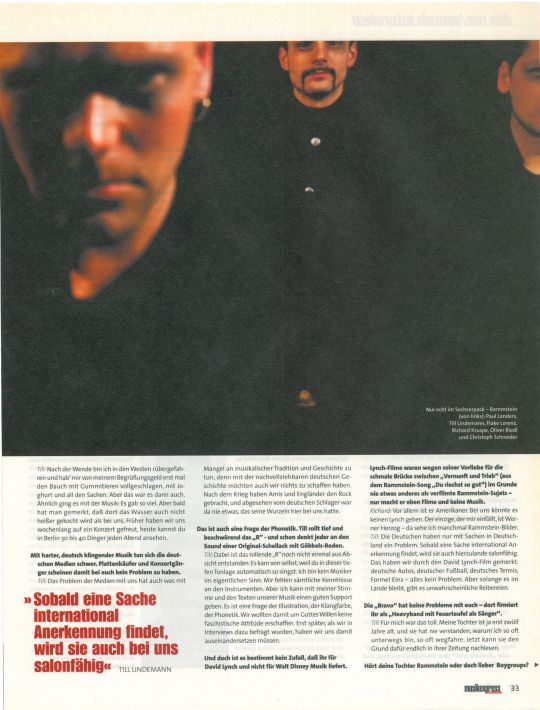


Musik Express - September 1997, Interview with Till and Richard
Thanks to Ramjohn for the scans!
Opinions are divided on this band - demonized by some, loved by many as passionately as the fire on their stage. An interview by Peter von Stahl.
In the press, adjectives such as 'controversial', 'fascistoid' or 'glorifying violence' can still be read in Rammstein stories. Is life good with this image?
Richard: We only depict violence in our shows and address it in our lyrics. We strictly reject using or propagating violence. Every kind of music serves a cliché in the mind of a journalist. Rammstein has this heaviness, these metal guitars. The right clichés immediately pop up in your head: long hair, short pants, American metal. And then comes a band that doesn't serve all of that anymore, that has a completely different, very own appearance - and then they need a new drawer. And it probably says 'controversial' on it.
Every artist says that in an interview — no one wants to fit into a drawer. Your music isn't that revolutionary.
Richard: But bands like Krupps or Front 242 are different. Rammstein is just unique. There is no band that sounds like Rammstein.
Till: I just have to listen to our neighboring rehearsal rooms: on the left it sounds like Pearl Jam, on the right like something else that you've known for a long time. You try to make it easy for yourself.
Richard: Maybe they just never got the hang of it because they only ever wanted to serve one market. Even more extreme in the West than here in the East. There was no market to serve.
Till: After the reunification, I drove over to the west and used my mountain greeting money to stuff my stomach with rubber animals, yoghurt and all that stuff. But that's about it. It was the same with music: there was so much. But soon it was noticed that the water is not boiled any hotter there than it is here. We used to look forward to a concert for weeks, today you can see 30 to 40 things in Berlin every evening.
The German media have a hard time with hard, German-sounding music. Record buyers and concert goers don't seem to have a problem with you.
Till: The media's problem with us also has something to do with a lack of musical tradition and history, because we don't want anything to do with understandable German history either. After the war, Americans and the English brought rock, and apart from German hits, there was never anything that had its roots here.
This is also a question of phonetics. Till rolls the 'R' deeply and evocatively - and everyone thinks of the sound of an original shellac with Göbbels speeches.
Till: The rolling 'R' didn't even come about on purpose. It came naturally because in that low pitch you sing like that automatically. I'm not actually a musician. I have absolutely no knowledge of the instruments. But I can give good support to our music with my voice and the lyrics. It's a matter of illustration, tone color, phonetics. We didn't want to create a fascist attitude, for God's sake. Only later, when we were asked about it in interviews, did we have to deal with it.
And yet it is certainly no coincidence that you provide music for David Lynch and not for Walt Disney. Because of his preference for the narrow bridge between 'reason and instinct' (from the Rammstein song 'Du riechst so gut'), Lynch films were basically never anything other than filmed Rammstein subjects - only he just makes films and no music.
Richard: First of all, he's an American. We couldn't have a Lynch. The only one I can think of is Werner Herzog — I sometimes see Rammstein pictures there.
Till: The Germans only have a problem with things in Germany. As soon as a thing finds international recognition, it also becomes socially acceptable here in Germany. We noticed that through the David Lynch film: German cars, German soccer, German tennis, Formula One — no problem at all. But as long as it stays in the country, there will be unlikely friction.
'Bravo' has no problems with you - there you operate as a 'heavy band with Feuerteufel as a singer'.
Till: That was great for me. My daughter is only twelve years old and she has never understood why I travel so often, drive away so often. Now she can finally read the reason why in her newspaper.
Does your daughter listen to Rammstein or rather boy bands?
Till: No, she listen to something else. She doesn't like boy bands that much, she prefers electronic stuff with a melody.
As a single father, how do you balance work and family?
Till: It wasn't that bad before, I played drums in a punk band and we practically had our rehearsal room in the house where I lived. I had them alone for seven years, but now I share parenthood with my daughter's mother again, because I'm on the road with the band half the year.
How does your daughter actually react to the hard Rammstein texts?
Till: She always giggles. She doesn't understand the extreme things yet.
Children watch movies and TV news on these topics without understanding them. The younger fans will feel the same about your lyrics.
Till: We never intended to make music for 13 or 14 year olds. This has only recently developed through 'Bravo', 'Viva' and so on. But when I see what's on the afternoon TV program, in the news, what's in the newspaper - they have to deal with that too. With their idols Tic Tac Toe they have to deal with prostitution, with drugs. Or with tampon ads on TV, where they see small, hidden gestures at dinner - how are we supposed to leave children disturbed?
After all, the menstrual fluid is kept in a friendly light blue in the advertising. With you, blood is still blood—deep red.
Till: First and foremost we make our music for ourselves. And the images it projects in people are very different. For some, the lyrics are totally incomprehensible, but they might like the music and just let it flow. On the other hand, a girl recently told me that she walked in a performance as the hooker that appears in our song 'Seemann' — the hooker who stands by the lantern.
Which of course is never mentioned in the text...
Till: Shall I explain that it's not about a whore, but about this and that? It's her picture, her story about the song.
When you sing about SM phenomena in songs like 'Bück dich' or 'Betraf mich' on the new record, the images are more clearly defined.
Richard: Just yesterday we were with some friends and discussed Rammstein. There was also a young evangelical pastor who was terribly upset about Rammstein and especially about the text of 'Bück dich'. He complained that more and more people in his youth community were listening to Rammstein and were therefore taking the wrong path. The evening grew longer and longer, they drank more and more - and at some point it turned out that the pastor himself was the only one in the group who really lived this 'bend over' sex and that he had a different woman almost every night drives in this way.
The church, especially the Catholic one, has enough internal institutions that deal intensively with Rammstein topics: incest, sin and punishment, the devil. In contrast, the anti-authoritarian educational models of the post-1968ers, the evangelical discussion groups, seem to have failed, also because of the denial of the existence of evil. How do you feel about raising your own children?
Till: One has absolutely nothing to do with the other. I try to separate Rammstein and my private life as much as possible. That's exactly how it is with the fire effects on our stage. I'm not a pyromaniac. I never light a cigarette privately. Just as Richard procures state-of-the-art musical equipment, it's my job to take care of the pyro effects for the show. We're a band that just does its job. Anyone who knows us privately cannot believe that we are so nice. We are quite normal, we do our job like fishermen who leave their hut in the morning, kiss their children, go out to sea, fetch the fish with the nets from the depths and return to the hut in the evening. Their children go out with them from time to time, and our children sometimes go to concerts too. But when they watch their father kill fish and gut them, they quickly realize that this is father's job. If they grow up with that, they're fine with that because they keep the two things separate.
In any case better than hiding from the child that the schnitzel on the plate was once a live pig that was slaughtered.
Richard: Just like the child of a sex performer or actress might at some point see their mother in a sex scene on TV and wonder where dad is. You will learn how to deal with that.
If every artist would live their madness of whatever kind in private, then there would almost certainly only be sick people in the charts. But: Do your lyrics at least help in your private fight against your very own, hidden demons?
Till: That happens. For me, solitude always gives me a creative boost — you have another glass of wine and you feel even more shitty. Art cannot do without suffering. Art is also there to compensate for suffering.
As one of the most successful metal acts in Germany, you will probably soon suffer too little to be able to continue to nurture your art.
Richard: Above all, we have no time to suffer. Except in the lonely hours after the concerts.
Till: It makes you feel like shit. You play a concert in Berlin in front of 16,000 people, then you cycle home from the rehearsal room because the after-show parties might not be the real thing either, you sit alone in your booth and have to come down again. It's like a hangover.
At this moment, your single father support group seems to be failing you.
Richard: If you sit on each other constantly for two years, you know the whole whining by heart.
Hartmut Engler from Pur says he still wants to put the whole feeling into his lyrics at the 67th gig.
Till: Sure — he always cries. Nonsense! Everybody is saying it! Maybe at the beginning, at the first two concerts. At some point it will become operational blindness. When 'Seemann' was still very fresh, I often felt a shiver. Later on, you tend to make sure that the intonation is right.
In many of your songs you can hear borrowings from the soundtracks of old spaghetti westerns. Who is actually the inveterate Ennio Morricone fan with you?
Richard: That's me.
Till: He's a fan of old cowboy music and movies.
In this sense, Rammstein is like Karl May - you don't have to murder, desecrate and humiliate yourself to be able to write lyrics about mauling, child abuse and incest.
Till: But that's exactly the point: you're talking about 'tearing, child abuse and incest'. I wish people would approach such topics much more sensitively. My daughter is at an age when something like this could really happen to her — maybe the day after tomorrow. And so I take it upon myself to imagine what that would be like. If it were about my daughter, I would probably want to cut off an egg from a perpetrator like that, shoot him or something. On the other hand, I can also sit in a dark corner and think about what drives him to do it. And about what drives me to be able to understand such a drive. Those are the two sides of this thing: On the one hand, reason, morality, my completely normal life — for me there's no question about that. But then I sit down, close my eyes and think about how, for example, the day before yesterday I felt such a longing for this grown woman — why shouldn't someone have such a longing too, who can't even help it, because he may have been abused himself in the past. And maybe he can't appreciate what it means to transfer that desire to a child. Where do you put the value, how do you want to judge?
It's shocking how many people were abused in their childhood. On the other hand, you are accused of the fact that your texts deal less with illness and morality than with the problem of overcoming the conflict between reason and instinct.
Till: No, no. Sick is sick, there is no discussion. And if it wasn't sick by normal standards, we wouldn't need mental hospitals anymore. But more important is the question of why and how it happens. Otherwise, this is only of interest to the lawyers who dig into their clients' childhood so that they can plead insanity. I've lived in the country for quite a long time and saw a horse molester almost lynched on the village street - I really felt sorry for him.
The line between everyday life and madness is known to be fluid. After all, the worst things happen every day in most cities behind every fifth window.
Till: If that's enough. Probably behind every third. And that's why I find it sad that lyrics about things that actually happen every day can kick up so much dust. For example, we had a listening session in Malta with Petra Husemann and Tim Renner from our record company. And when he heard the line 'Couple with your own flesh and blood' from the song 'Tier', Renner immediately dismissed it - a case for the index, which in Germany includes everything about sex with animals, incest, sibling love and so on acts. I don't understand that — you can even read about the relevant extras in the 'Bild' newspaper. And yet some act as if none of this exists.
And then? What have you done? Did you soften the text at the end?
Till: Nope. We aim for it.
I was never really interested in Rammstein myself until my wife put your record on again and again. On the other hand, feminists accuse you of the worst sexism.
Richard: We keep hearing that it was women who brought their men to Rammstein. Petra Husemann, the wife of Timm Renner (Rammstein's record boss/ed.), the girlfriend of our manager Emu, many wives and girlfriends of journalists. Men seem to have more of a problem with us than women.
Maybe that's because you're a lot better looking and have a lot more muscles than most media men.
Richard: It has more to do with head and gut. Rammstein frightens many men because they recognize qualities or character traits in our texts that they carry within themselves, but which they have suppressed.
So you mean you hold something like a mirror in front of the men's faces. A mirror in which they can suddenly and suddenly see the animal in them?
Richard: The animal, sure. A lot of things. A kind of machoness when we sing about the 'Wilder im Revier'.
Till: For us, the sexism that we are accused of is more about protecting women.
I'm really sorry, but now I can't follow. I do not understand that.
Till: For us, it's about understanding the woman's feelings and then showing them as extreme as they actually are. Yesterday a journalist asked us why we don't write love songs. Love, this is just this one brief moment. But after that, that's when the work begins. The constant misery: finding each other, falling in love, sticking it out for a while, then sticking it out, and then it all starts all over again.
Do you think you know more about women than men?
Till: No, not at all.
Perhaps for this reason you cannot imagine that husband and wife can be happy together in the long term.
Till: I don't know of any intact relationships. One or two maybe, but the circumstances aren't normal there — they don't see each other very often. I'm talking about this thing: getting out of the house in the morning and putting the kids to bed at night. Where are the theater visits, who still brings flowers? Being in love, bringing flowers to your loved ones — eventually it always ends.
That's why the resolute 'no' to the female marriage wish on your new single 'Du hast'?
Till: 'until death do you part...' — that's just as unnatural as a tattoo on your arm. It won't go out for the rest of my life. At some point, as a pensioner, I’ll sit with my grandson on my lap and he’ll ask what kind of silly thing I have on my upper arm.
However, Rammstein does not seem to want to live entirely without women. After all, you've now recorded a hymn to the primary female sex organ. What do you say in the rehearsal room when you want to play this song?
Till: Sometimes we say, 'Now let's play cunt!' Isn't that what you wanted to hear?
The song title 'Kiss me, Fellfrosch' sounds a lot more tender.
Till: Fellfrosch — the word alone is a homage to this part of the body. That's a nice, childish way of looking at things: fur stands for small, furry little animals. Hamsters, guinea pigs and such. And frog or snail takes care of the second part. Fascination and disgust, both play a role.
Perhaps the disgust at the bitter aftertaste is really just a problem of overly careless personal hygiene?
Richard: Tastes change too. Much of what seemed too bitter to us in childhood tastes good to us today. On the other hand, we usually find the sweets from the past too sweet. Every fur frog tastes different. Pure question of taste. There is no judgment in the text. We're not saying it stinks.
Feminists will not see the 'fur frog' in such a differentiated way. This will cause trouble.
Till: Hopefully! That's the same topic as before: It's about something that is completely self-evident and that everyone knows. That's the most normal thing in the world. Exaggerated feminism, on the other hand, is an indictment. And when they get upset about it, that's ultimately just proof to me that they don't have a sense of humor. Just the other day someone told me a joke about a forty-centimetre cock. It was a woman.
#Rammstein#Till Lindemann#Richard Kruspe#1997#interview#translation#*scans#*#great in depth interview with Till mostly
112 notes
·
View notes
Text
youtube
tatort 154: freiwild, wolfgang staudte 1984
#tatort#freiwild#wolfgang staudte#1984#volker brandt#helmut gauss#armin mueller-stahl#hans-peter hallwachs#witta pohl#tilly lauenstein#marsha cox#bruno hübner#paul albert krumm#hans helmut dickow#peter kuiper#manfred günther#le feu follet#alphaville#contergan#gods of the plague#lipinski
0 notes